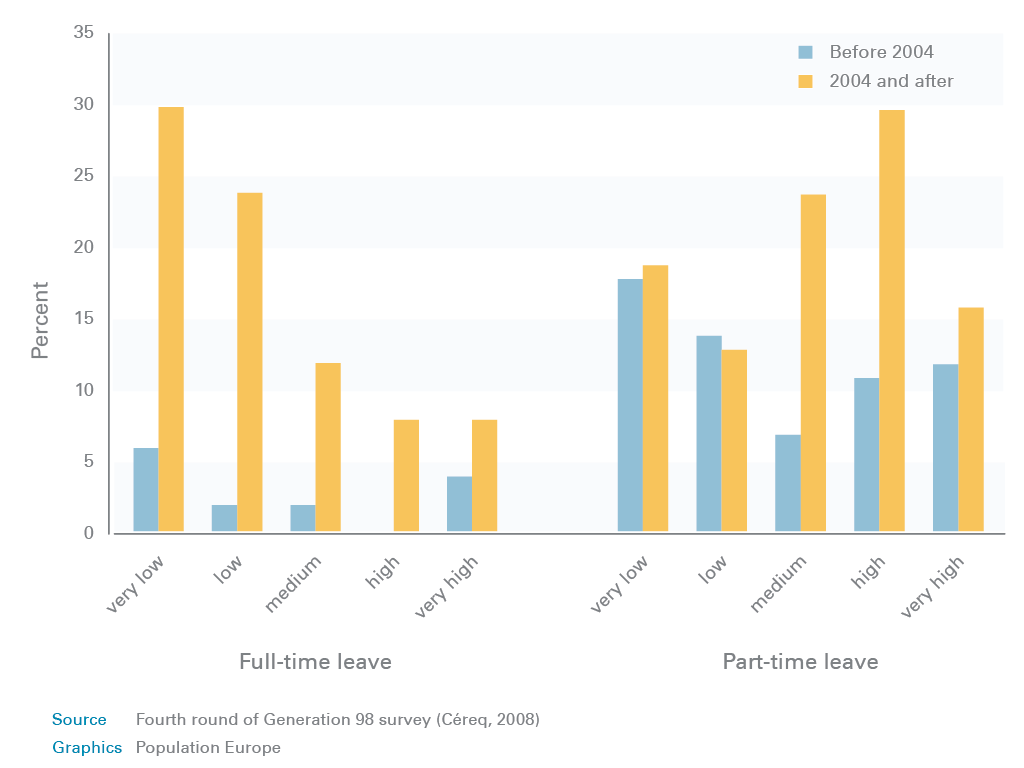There is a growing debate in Europe about whether parental leave should be short or long. Although career interruptions for childbearing and child rearing are one of the key explanatory factors in women's lower earnings, there is no clear consensus on how long parental leave should optimally last. Olivier Joseph and colleagues evaluate the impact of short parental leave on mothers' employment status and subsequent wages in France.
The study is one of the first that especially looks at the impact of part-time parental leave on employment performance. It is based on the analysis of a policy reform that took place in 2004 called Complément Libre Choix d'Activité (CLCA) or “supplementary work choice benefit”. The initiative aimed to provide financial support for new parents, who temporarily interrupt their careers. The benefit is paid for a maximum period of six months after the birth of a first child. Parents can choose to receive a reduced sum whilst working part-time. Before 2004, for parents with one child, there were only leave-schemes without financial compensation available.
Change in women’s behaviour
In France, as everywhere else in the world, women are much more likely to make use of parental leave schemes than men. The authors believe that the implementation of the CLCA reform is likely to affect women labour force participation: by offering short paid leave from the first child, the reform might have provided an incentive for mothers to take parental leave.
Results show that the benefit has changed the employment behaviour of all mothers: More new mothers interrupted their careers after giving birth, but depending on their socio-economic status they did it in different ways . After 2004, full-time leaves are more frequent among women with low income (Figure 1). At the same time, percentages of women taking part-time-leave after 2004 are much higher among mothers whose earnings fall in the average to very high range.

Graph 1: percentage of women employed before the birth of their first child who then opted for parental leave, grouped by their pre-motherhood wages
Lower unemployment rate and lower wages
The effects on their career outcomes differ depending on whether mothers take full-time or part-time parental leave. Short paied full-time parental leave had almost no effect on labour market participation and wages of first mothers at the global level. The only visible effect is a lower likelihood of being out of the labour force for low-educated women, both 18 and 24 months after birth.
For the group that took part time leave, the reform increased the employment rate but decreased the subsequent wages, especially for medium and highly educated women, who are most frequently using this leave-option. The wage increase is lower for part-time parental leave takers, and remains so two years after the child's birth.
Results suggest that mothers may prefer part-time employment, for work-family balance reasons, and continue working part-time beyond the benefit period. Even though the interruption is short, some negative effects on later earnings are observed.
Furthermore, even though it is available for fathers, this parental leave is almost never taken by men and is likely to encourage couple specialisation, with the woman reducing her labour market investment quite early in the lifecycle. The debate over the introduction of short but better paid parental leave as a tool to involve fathers is still on the agenda. However, the authors wonder whether a shared parental leave with separate rights for mothers and fathers, currently debated, might not be more appropriate to achieve gender equality.

*This PopDigest has received funding from the European Union's Seventh Framework Programme (FP7/2007-2013) under grant agreement n° 320116 for the research project FamiliesAndSocieties.
FamiliesAndSocieties (www.familiesandsocieties.eu) has the aim to investigate the diversity of family forms, relationships and life courses in Europe, to assess the compatibility of existing policies with these changes, and to contribute to evidence-based policy-making. The consortium brings together 25 leading universities and research institutes in 15 European countries and three transnational civil society organizations.